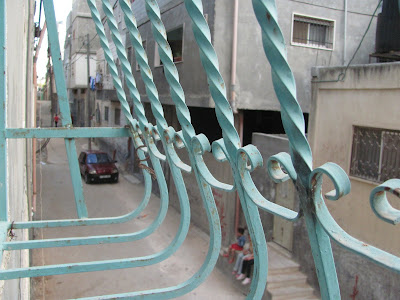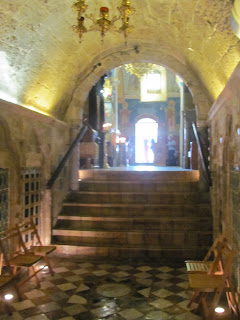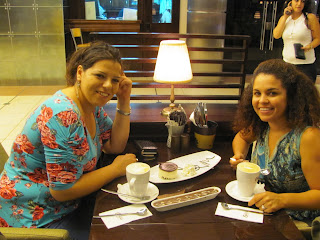
Many contrasting feelings: happiness to see my girls, but anger to see the environment they are living in. Anger because I cannot promise them that it will be better soon. They are beautiful girls and they will soon grow to be strong, but who has the luxury to be weak living under occupation, it hardens your heart. It hurts me to see this covered systematic violence,many times physical, but here expressed in lack of opportunities, while our kids in America and even here in Israel have sports, music, art and have to be involved in all sorts of after school activities. Here, there is little of that, whatever the UN and other NGO's provide, but it is not their responsibility to raise kids and they can do all but give them the freedom that they need.
It breaks my heart and I feel like crying in front of them and telling them that it is my fault, because my government is supporting the occupation. My government is supplying weapons and billions of dollars to sustain the occupation. I wish I could tell them that this is why I am here, to show that there is people who care!!!I wish I could tell them that me and many others in America do not support our government but are not enough to break the corrupted system that just wants to occupy land (in Israel) and minds there (in the US). That our government claims to be fighting the "war on terror" on our name and with our money. That along with Israel they claim that the West Bank and Gaza are one more school for terrorists and that ending the occupation, will mean another Al- Qaeda haven to breed terrorists.
HOPE

On the other hand, I am so happy and humbled to be here and to share the simple, but sometimes crazy daily life in Palestine. The refugee camp I stayed is a labyrinth, many ways to get in and out. It can intimidate you with its graffiti and paintings of people whom you might not know, but every Palestinian knows well. Its narrow allies, where not more than one can pass at the same time or even cannot open your arms wide can scare you. When you walk, you can see your neighbor's living room and smell their food, there's no such thing as privacy.
I feel lucky and ashamed at the same time, that I can be in Bethlehem and next I can show my blue passport and next thing be in the Old City of Jerusalem, something not every Palestinian can do. I didn't ask for that, I didn't even chose that, I was born with it, as the Palestinians are born under occupation.
I wish I could take my girls in a car and go to the sea, they have asked me..... They have never been to the sea, even though it is a 45 minute drive. I know that it is not going to change anything, but at least I know that I will see the most beautiful smiles in the world. That is something, and they will see beyond the Wall, they will know there is something else....
CREATIVITY

Now I am in the bus on the way to Ramallah. I can see rain falling on the windshield, it's smell is unique. It has been a long time since I saw rain falling, last time, I was home so it reminds me of Puerto Rico. We drive by Maale Adumim,is an Israeli settlement. With a population of about 34,000 it's a city on its own. Ma'ale Adumim was established in 1976 on territory occupied since the 1967 Six-Day War. It was built as a planned community and suburban commuter town to nearby Jerusalem, to which many residents commute daily. They have big recreational spaces, an irony that is built on occupied land and that Palestinians cannot enter.

Everytime I am in a bus in Palestine and I see an Israeli settlement, I look to the side at the Palestinian sitting next to me and wonder what are they exactly thinking, living in this land, that they love so much and watching powerlessly how everyday they are stripped of more, and more land while Americans and Internationals come and go, curiously taking pictures, listening to stories, while the occupation is still here taking more land, more young people into jails and robbing children of their childhood. But then I go somewhere and I listen to someone's story and reflect on the 62 years that they have endured in jails and refugee camps with resilience. Or simple see the kids on the street playing and when I pass they start saying: What's your name? That gives me hope that one day my girls will be going to the Mediterranean and watch the most amazing sunset.....One day.....we'll all be free.
Sunset in the Mediterranean Sea

My sweet girls....how can you not love them and want to end the occupation so they have something to live and hope for...






































